SURA 2022 Student Blog
Get all our news
Each summer since 1998, the Institute for Policy Research (IPR) has run the Summer Undergraduate Research Assistants (SURA) program, which gives undergraduate students first-hand experience in the conceptualization and conduct of policy-relevant social science research. This year, SURA students are sharing their research experience from their own perspective, and we will feature students discussing the research projects they are part of throughout the summer.
Emily Lam | Donny Tou | Lahari Ramini | Rahul Aggarwal | Leila Stoll | Vicky Chung
Emily Lam: Expanding Technology Access Among Patients with Diabetes
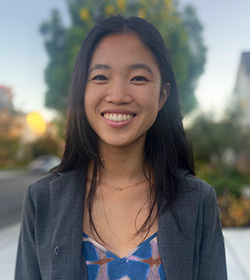 Emily Lam is working with endocrinologist and IPR associate Amisha Wallia to understand the gap in technology use among patients with diabetes during COVID-19.
Emily Lam is working with endocrinologist and IPR associate Amisha Wallia to understand the gap in technology use among patients with diabetes during COVID-19.
I am working as a research assistant for Dr. Amisha Wallia this summer on her team’s new study called “The Accelerate AHEAD Study: Evaluating Diabetes Technology Use in Primary Care,” through the Chicago Center for Diabetes Translation Research (CCDTR). As part of the research study, we are working to investigate the gap in technology access among patients with diabetes during the COVID-19 era and to collaborate with stakeholders to develop novel, user-centered solutions.
Through my literature search, I have learned about the potential for diabetes management tools, such as continuous glucose monitoring and telemedicine. We have such innovative technologies, but inequitable access obstructs many from receiving the necessary medical care. For example, prior studies find that using telemedicine—which can improve healthcare access—decreases with factors including older age, public insurance status, and not speaking English as a first language.
Provider biases, which are attitudes informed by structural inequalities that affect how clinicians treat patients, further contribute to these disparities. These barriers compound each other, and such disparities in access and disease burdens fall disproportionately on communities of color. COVID-19 has exacerbated the gap in technology access as many healthcare services shifted online.
While I hope to continue to work on qualitative methods, my current work has consisted of setting up the database, which includes researching and consolidating medical coding strategies utilized for research with federally qualified health centers. This work has taught me how involved the whole research process is beyond the analysis I typically associate with research.
I have also learned how partnerships (CCDTR, Center for Human-Computer Interaction + Design, Segal Design Institute, AllianceChicago, and Feinberg School of Medicine) can set up a successful project, innovate, and advance health equity. In addition, the team’s researchers have expertise in various fields, such as endocrinology, health literacy, and implementation science, enabling them to address these complex, real-world problems. I have also gained a greater appreciation of building trust and collaborative partnerships with stakeholders to center the community’s needs.
Emily Lam (she/her) is a rising third-year student from Irvine, California. She is a part of the Honors Program in Medical Education (HPME), studying biological sciences and science in human culture on the pre-med track. She hopes to pursue a career in medicine and public health to promote health equity among marginalized populations.
Donny Tou: Understanding Cross-Sector Collaborations for Public Interest
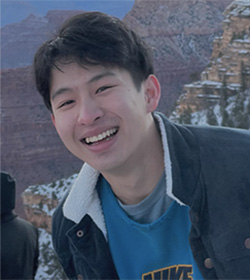 Donny Tou is working with IPR associate Aaron Shaw, co-founder and faculty member of the Community Data Science Collective (CDSC), to study cross-sector collaborations and partnerships in the context of the COVID-19 response within King County, Washington.
Donny Tou is working with IPR associate Aaron Shaw, co-founder and faculty member of the Community Data Science Collective (CDSC), to study cross-sector collaborations and partnerships in the context of the COVID-19 response within King County, Washington.
This summer, I am working with Dr. Aaron Shaw on a set of comparative case studies highlighting instances of cross-sector collaborations within King County that have been integral to the COVID-19 pandemic response. The project emphasizes the importance of creating partnerships for effective solutions to many of the challenges we face today, including combatting the pandemic, achieving climate change mitigation, and promoting healthcare access.
These collaborations, however, vary substantially in their characteristics and face unique challenges such as misaligned incentives among actors and a lack of formal structures to coordinate action. How do divided actors decide to unite and collectively undertake action? Under which conditions do cross-sector collaborations succeed and fail? Why do some efforts generate a higher impact than others? Through investigating these questions, this project aims to deepen our understanding of cross-sector collaborations and the characteristics that promote their success.
My work involves identifying, selecting, and assessing relevant cases for inclusion in the project, including specific tasks such as conducting extensive literature searches and synthesizing key variations that characterize collaborations. Overall, this experience has highlighted the importance of human organization within public policy. It is often easy to get lost in the qualitative and quantitative data necessary for policy analysis, but the importance of cross-sector collaboration for the actual implementation of concrete solutions has surprised me. Advancing the understanding of this form of collaboration can subsequently lead to policy solutions that benefit the communities these partnerships serve.
Donny Tou is a rising sophomore from Newton, Massachusetts, pursuing a double major in social policy and economics with a certificate of civic engagement. His curiosity about the intersection of public policy and institutional change ignited his interest in both qualitative and quantitative social science research. In his free time, he enjoys longboarding, spending time in nature, and attempting to make music.
Lahari Ramini: Investigating Tools to Measure Water, Sanitation, and Hygiene in Schools and Clinics
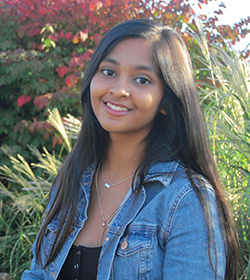 Lahari Ramini is working with IPR anthropologist Sera Young to conduct a literature review to examine tools currently used to measure water, sanitation, and hygiene (WASH) in institutions such as hospitals, schools, and prisons. This literature review will be the basis for developing a new scale in which human experiences are considered as part of WASH measurements in institutions.
Lahari Ramini is working with IPR anthropologist Sera Young to conduct a literature review to examine tools currently used to measure water, sanitation, and hygiene (WASH) in institutions such as hospitals, schools, and prisons. This literature review will be the basis for developing a new scale in which human experiences are considered as part of WASH measurements in institutions.
I am working with Dr. Sera Young's research group, which has already tested and validated individual and household measures of water insecurity globally (the Water Insecurity Experiences Scales). Their next adventure is to create an experience-based tool for measuring water, sanitation, and hygiene (WASH) in institutions. Once this tool is developed, data that tells us about who has adequate WASH, and who does not, can be collected and evaluated. To that end, I was asked to conduct a literature review.
Fairly early on in my work on the review, I was shocked to find that there was no tool for measuring experiences with something as universal as water, sanitation, and hygiene (WASH) in the context of places like schools, clinics, or hospitals. This was concerning, provided the importance of drinking water and cleanliness for human health and wellbeing, as Dr. Young and other scholars in the field have previously found.
I carefully pored over several papers describing tools to measure WASH in institutions, but found them wanting for several reasons, many stemming from the novelty of measuring WASH in institutions. Without a way to measure the problem rigorously, our knowledge remains anecdotal, not data driven. We are left unaware of those who could be vulnerable to such problems, and without this knowledge, potential interventions or other solutions are difficult.
Developing this literature review taught me the importance of assessing current literature and the complexity of developing scales. I hope to take the lesson about targeting those who need it most with me in my future involvement in health policy.
Lahari Ramini is a rising junior from Omaha, Nebraska. She is studying cognitive science and global health on a pre-health track, hoping to one day be a healthcare provider involved in health policy and implementation. Ramini joined the SURA program to learn how research influences policies that affect the real world. Outside of class, you can find her involved in Northwestern’s Emergency Medical Organization, practicing her skills as a student DJ, or playing some jams with Northwestern’s Ukulele Club. She is also an Anderson Scholar and received funding from a gift that supports students in the Weinberg College of Arts and Sciences pursuing summer research opportunities.
Rahul Aggarwal: Uncovering Behaviors Related to Non-Medical Opioid Misuse
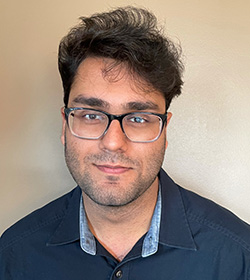 Rahul Aggarwal is working with sociologist and IPR associate Maryann Mason to understand how and why older adults misuse opioids.
Rahul Aggarwal is working with sociologist and IPR associate Maryann Mason to understand how and why older adults misuse opioids.
I have been fortunate enough to help Dr. Maryann Mason with her ongoing investigations into opioid misuse among older adults. Specifically, I am interviewing healthcare providers, outreach workers, addiction counselors, and behavioral specialists about their perspectives on older adults’ opioid misuse within the city of Chicago.
In the U.S., older adults ages 55 and older are often overlooked as recreational drug users, despite an immense 1,886% increase in the number of opioid overdose deaths from 1999 to 2019. Many older adults do not fit the national stereotype of an opioid user and are consequently “missed” during screening for opioid misuse. By uncovering behaviors pertinent to opioid misuse, we wish to paint a portrait of the Chicago older adult who is at risk for opioid overdose deaths to better inform healthcare systems on how to care for them.
Through this research, I was surprised to learn about the many determinants beyond someone’s physical and mental health which may influence their drug use. These include culture around drug use, stigma, racial disparities, housing instability, isolation, and exposure to healthcare.
As I think about what’s missing from the patient’s chart and more about their life story, this brings me to what I learned: Social science research invites a lot of critical thinking and forces you to look at the bigger picture. When looking at your data, you will often find patterns that prompt important questions and push you to think about their larger implications. I have been grateful for my SURA experience, and I look forward to applying these lessons in my career.
Rahul Aggarwal (he/him) is a rising junior from the suburbs of Chicago. He is pursuing a degree in neuroscience with the hopes of one day becoming a physician and public health researcher. His interest in universal healthcare access has prompted him to work with Dr. Mason and think more about the opioid epidemic. Rahul is also an Anderson Scholar and received funding from a gift that supports students in the Weinberg College of Arts and Sciences pursuing summer research opportunities.
Leila Stoll: Improving Early Education Policies
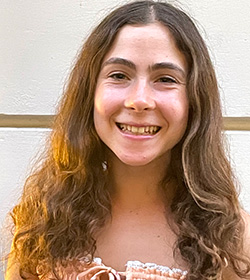 Leila Stoll is working with IPR developmental psychologist Terri Sabol and IPR director and economist Diane Whitmore Schanzenbach to explore how universal pre-K in Chicago Public Schools has influenced the city’s early childhood education landscape.
Leila Stoll is working with IPR developmental psychologist Terri Sabol and IPR director and economist Diane Whitmore Schanzenbach to explore how universal pre-K in Chicago Public Schools has influenced the city’s early childhood education landscape.
This summer, I am working with Dr. Terri Sabol and Dr. Diane Whitmore Schanzenbach to study the dual impact of the COVID-19 pandemic and the rollout of universal pre-K on Chicago’s early childhood education market. Specifically, we are looking at how the increase in pre-K programs offered by Chicago Public Schools as part of their “Pre-K for All” initiative has affected the availability and quality of community-based pre-K programs throughout the city.
My interest in Dr. Sabol’s research stems from my experience working with school-aged children as a dance teacher and writing tutor, as well as my overarching interest in how public policies affect peoples’ educational opportunities and wellbeing. A major aspect of the study is interviewing administrators, teachers, and parents about their experiences within Chicago pre-K programs amidst the pandemic. Hearing their reports about their experiences and analyzing their common challenges could help us offer Chicago important insights on creating better early education policies during times of crisis and outside of them.
One interesting lesson I have learned from working on this project is that government policies, even when well thought out, can have unexpected consequences. This is something I want to remember, not only as I consider a career in policymaking but also as I continue to live in a world where government decisions consistently influence my loved ones’ lives and my own.
Participating in SURA has revealed to me how social science research allows us to use academic tools to explore the world around us and make it better. I’m incredibly grateful to Dr. Sabol and IPR for this opportunity and am excited to see how our study progresses.
Leila Stoll (she/her) is a rising sophomore from Lafayette, California. She is majoring in psychology and economics and hopes to pursue a minor in global health studies or environmental policy and culture. Leila would like her career to focus on improving the health, educational outcomes, and environmental wellbeing of individuals and communities worldwide. Outside of academics, she loves to dance, hike, travel, and spend time with friends, family, and her dog Blake. She is also an Anderson Scholar and received funding from a gift that supports students in the Weinberg College of Arts and Sciences pursuing summer research opportunities.
Vicky Chung: Examining and Minimizing Health Disparities
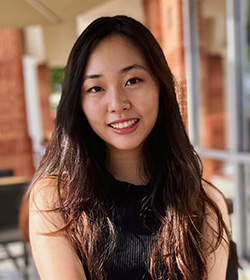 Vicky Chung is working with IPR health psychologist Greg Miller at the Foundations of Health Research Center within the Institute for Policy Research on three research projects that seek to improve health equity.
Vicky Chung is working with IPR health psychologist Greg Miller at the Foundations of Health Research Center within the Institute for Policy Research on three research projects that seek to improve health equity.
One of the projects I’m working on this summer with Dr. Greg Miller is the Stress, Pregnancy, and Health (SPAH) study, which aims to study the effects of stress and socioeconomic factors on pregnant women. Specifically, it focuses on the possibility of adverse gestational environments.
The second study—On the Rise (OTR)—focuses on the family, neighborhood, school, and work experiences of African American youth and explores how these experiences affect their physical and mental health, as well as their academic success.
The third, Mentoring and Health Study (MHS), looks at the psychological and physical health effects of mentors and mentees in mentoring relationships.
Though each study may focus on a different population, they all shed light on how socioeconomic status and race are factors that affect a person’s physical and mental health.
I worked both with dry lab procedures—such as qualitative interviews about participants’ living situations and stressful events in their lives—as well as wet lab procedures—such as conducting immunoassays, or tests, to quantify substances to see if there is a biological correlation with the qualitative data. Working with biological and social science methods gave me the rare opportunity to see the value of using both to reach impactful conclusions.
I also felt a sense of personal responsibility toward the people participating in these studies while working on these projects. As someone aspiring to work in healthcare, I found it eye-opening to see how willing people were to share extremely personal information and how they gave their consent for this information to be used in research that would directly impact them. It reminded me that while working with technology and tracking data is fun and exciting, the real heart of research centers on the population it is meant to serve. Real people are trusting us with their personal information to make their communities better.
Last, I enjoyed experiencing the mutual respect in our lab: Postdoctoral researchers are willing to learn a procedure from an undergraduate student, and a principal investigator (PI) is willing to sit down with a new hire to hear their opinions on how the lab is running. All of this showed me how this type of research is best conducted as part of a team effort that becomes a valuable experience for everyone involved.
Vicky Chung is a rising junior from Lawrenceville, Georgia, a suburb of Atlanta. She is pursuing a degree in biological sciences with a minor in creative writing. After graduating, she hopes to combine her passion for medicine and media by focusing on improving communication between healthcare professionals and patients.
Updated 9/7/2022
Published: August 24, 2022.


